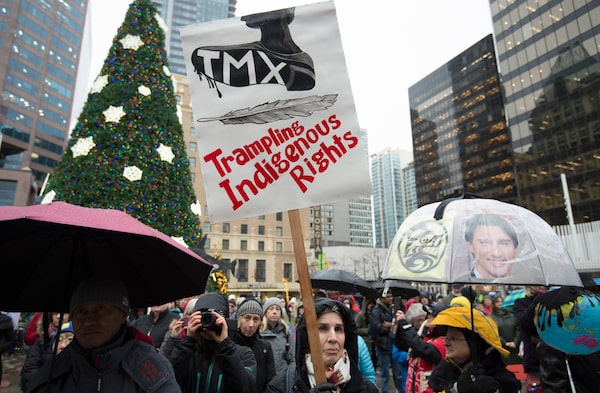
Protesters attend an anti Trans Mountain pipeline rally in downtown Vancouver, Dec. 16, 2019.JONATHAN HAYWARD/The Canadian Press
The federal government failed to share information, imposed unrealistic deadlines and refused to consider changes proposed by First Nations that would be affected by the proposed Trans Mountain expansion project, lawyers for B.C. First Nations challenging the project’s approval told a three-judge panel in Vancouver.
Those and other shortcomings mean the government failed in its duty to consult with First Nations and that the government’s approval should be quashed, lawyers representing the First Nations said Monday.
Scott Smith, a lawyer representing B.C.'s Tsleil-Waututh Nation, said the government initially refused to provide its review of three reports the First Nation had commissioned to assess potential effects of the project, including oil spills, despite repeated requests by the First Nation for the review.
Even though the government’s review matched some conclusions in the Tsleil-Waututh reports, the government would not change the project in response, Mr. Smith said.
“Even when [the government’s] scientists agreed with Tsleil Waututh’s experts, Canada simply refused to budge on any of these issues or change its positions because it was unilaterally focused on reapproving the project and, in the words of the minister of finance, ‘getting shovels into the ground,' " Mr. Smith said in court.
The Tsleil-Waututh and three other Indigenous groups are challenging Ottawa’s approval of the Trans Mountain expansion project, which would triple the capacity of an existing pipeline that carries oil and refined products from near Edmonton to an export terminal near Vancouver.
Prime Minister Justin Trudeau first approved the project in 2016. The Federal Court of Appeal quashed that approval in 2018, citing inadequate consultation with First Nations and a review process that failed to consider the project’s potential impact on endangered killer whales. After another round of consultations, the federal government reapproved the project in June.
Several First Nations, environmental groups and the City of Vancouver filed challenges to the reapproval. This past September, a Federal Court of Appeal judge dismissed six appeals and allowed six others, all from First Nations, to proceed.
Two First Nations have since dropped out of the appeal after reaching deals with Trans Mountain Corp., the Crown corporation that runs the existing pipeline and is building the expansion. The federal government bought the existing pipeline and other assets last year.
The Tsleil-Waututh and three other applicants – the Coldwater Indian Band, the Squamish Nation and a coalition of Sto:lo bands based in the Fraser Valley – are now challenging the project’s reapproval.
Matthew Kirchner, a lawyer representing the Coldwater Indian Band, said the second round of consultations was rushed and featured a last-minute proposal to alter the route to which the Coldwater was provided only a few days to respond.
“Where, between Friday night and Wednesday, is there going to be time for comments, feedback, and dialogue?” Mr. Kirchner said, referring to the time federal regulators provided to the Coldwater.
“It’s impossible.”
The primary residential community for the Coldwater Indian Band is the Coldwater Reserve, about 12 kilometres southwest of Merritt, B.C.
The proposed expansion would cross two creeks that feed an aquifer that is the sole source of drinking water for about 300 members who live on reserve. Coldwater maintains risks to the aquifer have not been adequately studied or addressed.
Joelle Walker, a lawyer representing the Sto:lo bands, said the second round of consultations had “the exact same failings” as the first, including a failure to discuss specific steps that might mitigate impacts.
In a statement before the hearing started, Natural Resources Canada said that it would vigorously defend its decision to approve the project and that consultations “involved meaningful, two-way dialogue, which fulfilled the legal duty to consult.”
In a protest near the courthouse, anti-pipeline advocates gathered to support the court action.
“Our people, our Indigenous people, we’ve known there are issues with water," said Judy Wilson, chief of the Neskonlith.
“For Trudeau and outright buy the pipeline, and say it’s a public taxpayer investment, I would say that’s the biggest scandal in Canada. It’s not SNC-Lavalin, it’s Trans Mountain pipeline.”
Lawyers for the Canadian government are expected to present arguments Tuesday.
With a report from Carol Eugene Park and The Canadian Press
We have a weekly Western Canada newsletter written by our B.C. and Alberta bureau chiefs, providing a comprehensive package of the news you need to know about the region and its place in the issues facing Canada. Sign up today.
 Wendy Stueck
Wendy Stueck